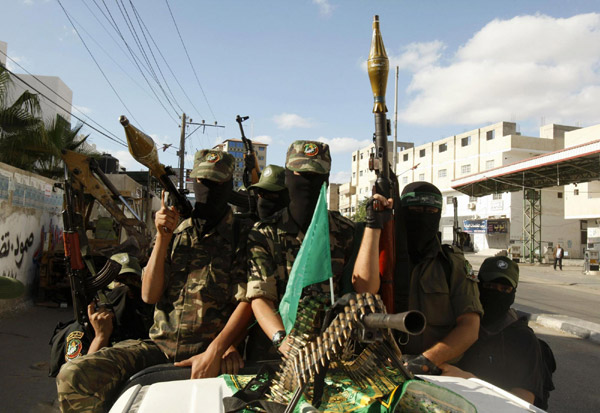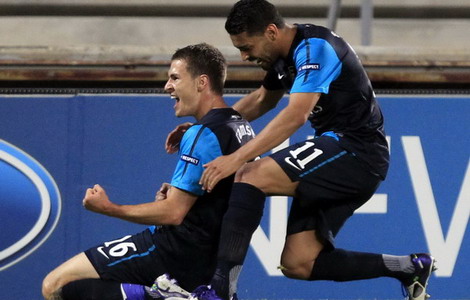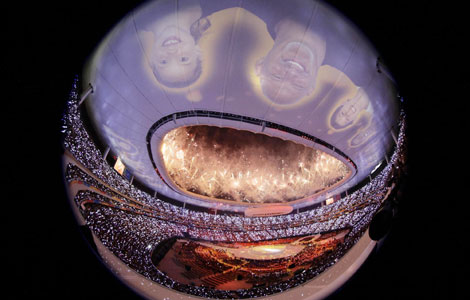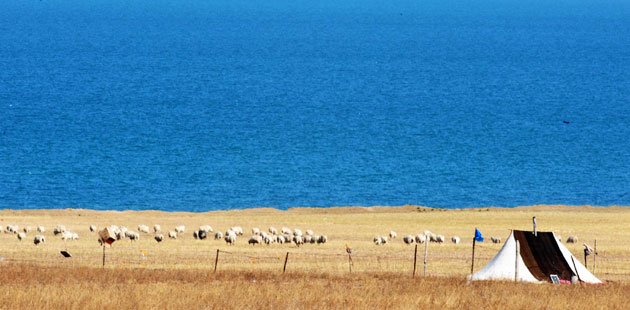Hamas rhapsody may bridge gaps with Fatah
Updated: 2011-10-20 10:25
(Xinhua)
|
|||||||||||
 |
|
Hamas militants patrol during their visit to the freed Palestinian prisoners in Rafah in southern Gaza Strip October 19, 2011. [Photo/Agencies] |
GAZA - The timing of implementing a prisoner swap deal between Hamas and Israel may bridge the gaps between the Islamic movement and President Mahmoud Abbas' Fatah party and promote their reconciliation, Palestinian observers predicted.
Although some analysts see the timing of the deal as a double response of Hamas and Israel to the overwhelming success Abbas had achieved when he submitted a request to the United Nations for full membership of a Palestinian state, there has been a significant rapprochement between Hamas and Fatah.
Abbas blessed the deal and considered it as "an achievement," while top Hamas leaders, Ismail Haneya and Khaled Meshaal, spoke with Abbas on the phone to brief him on the details of the deal and coordinate with him in holding a joint reception for the freed prisoners from the Gaza Strip and the West Bank.
In a rare scene, Abbas stood shoulder to shoulder with the most prominent leaders of Hamas to greet freed prisoners in the West Bank city of Ramallah amid calls for reconciliation, while Fatah supporters were allowed to join rallies and wave their own flags for the first time in Gaza since Hamas took control of the enclave four years ago.
These signs had reflected an atmosphere of relative optimism that the two rival movements would step forward toward achieving the long-waited real reconciliation amid a feeling of ecstasy and an increase in their popular support among the Palestinians in the West Bank and Gaza.
Abbas had earned tremendous support when he submitted the request of statehood to the UN last month despite the United States and Israel rejection, while the lights were shed again on the Hamas movement after it finally succeeded in finalizing the prisoner swap deal with Israel.
Akram Atallah, a Gaza-based political analyst, told Xinhua that the circumstances politically and practically had become more ready for the two sides more than before to pave the road for reconciliation, adding: "The mountain of ice is finally melting and they need more steps forward."
Hani al-Masri, chairman of Bada'el Center for Research in Ramallah, said that as Abbas is now politically and popularly stronger, his popularity won't be damaged after Hamas earned similar political and popular support by finalizing the swap deal.
"A strong Fatah party can easily and quickly reconcile with a strong Hamas movement, but when Fatah and Hamas were popularly weak, implementing the reconciliation in unpleasant circumstances for this party or that one would be difficult and hard to be implemented," said al-Masri.
Feuds between Fatah and Hamas began when the latter seized control of the Gaza Strip by force in June 2007. However, they had signed in Cairo in May 4 on an Egyptian-brokered reconciliation pact, but this pact is still pending due to deep differences on forming an interim unity government.
However, new positive signs were clear within the last few hours as President Abbas is expected to meet in Cairo with Hamas chief in Damascus Khaled Meshaal soon. Well-informed Palestinian sources revealed to Xinhua that Abbas would propose holding elections to overcome their differences.
Aadel Samara, another West Bank-based political analyst, ruled out the possibility that the two rival movements would go for general elections very soon "due to the ongoing division between the Gaza Strip and the West Bank."
Hamas rules the Gaza Strip, while Abbas and his Fatah Party rule the West Bank.
"There is still no confidence between them. They still need a proper period of real reconciliation, even if it will be temporary to regain confidence, practice coexistence and partnership, and draw a joint strategy for achieving national goals in a way that eases a future agreement between them," said Samara.
Hot Topics
Libya conflict, Gaddafi, Oil spill, Palace Museum scandal, Inflation, Japan's new PM, Trapped miners, Mooncake tax, Weekly photos, Hurricane Irene
Editor's Picks

|

|

|

|

|

|







